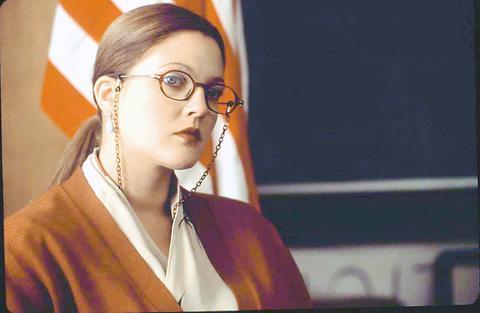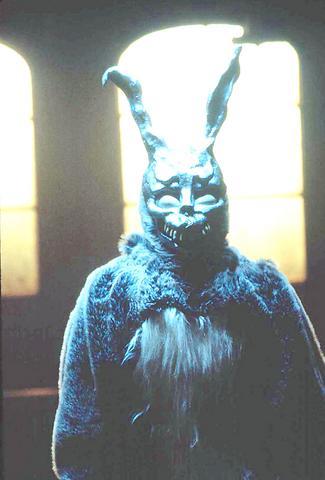The influence of John Hughes is fully felt in the melodrama Donnie Darko. This first film written and directed by Richard Kelly is a wobbly cannonball of a movie that tries to go Hughes one better; it's like a Hughes version of a novel by Gabriel Garcia Marquez. You want the movie to work, even though it becomes evident early on that it doesn't, succumbing to a need to crawl into the head of its troubled young protagonist, Donnie Darko (Jake Gyllenhaal).
Donnie is a schizophrenic teenager whose guilt over his state is a dark cloud in his eyes, though his good-humored mother (Mary McDonnell) regards her son's condition with loving bemusement. "How does it feel to have a wacko for a son?" he says in a voice thick with self-loathing. "It feels wonderful," she responds. It's this compulsion to solder melancholy to weightlessness that constantly trips up the movie; Kelly doesn't have the assurance to pull off such a difficult feat.
He labors to bring science fiction, grim comedy and social satire into his story of a haunted misfit. The crash of a jet engine early on -- the turbine tumbles right through the Darko house -- will have repercussions that affect everything, and the chaos it leaves seems similar to the mess in Donnie's head.

PHOTO COURTESY OF HUACHAN
The corkscrew of a narrative follows Donnie through dire events that aggravate his anguish; he causes a scene almost every time he interacts with others. Yet he has no trouble in capturing the heart of his new neighbor Gretchen (Jena Malone); to her, he's more sane than the bullies and misfits who make up the rest of their high school class. As Donnie struggles through his uneasy relationships with people in school and his family, he is accompanied by a six-foot rabbit and he develops the power to see rifts in time -- tunnels into the future that appear in people's midsections. As he uses this ability and later travels through time, Donnie finally comprehends his place in the world. This is, to some extent, Kelly's explanation of Donnie's mutant affliction.
Kelly wants his movie to cover a lot of ground by setting it in 1988, a backdrop he acknowledges by having Donnie's sister (well played by Gyllenhaal's real sister, Maggie) tell her father she is going to vote for Michael Dukakis for president. The period is further evoked through the 1980s icons Drew Barrymore (whose company produced the film) and Patrick Swayze.
Though the picture is set in the Reagan era and the Me Decade, it is really a fusion of eras, even glancing back to the 1960s by casting Katharine Ross -- Dustin Hoffman's oasis in The Graduate -- as Donnie's therapist, who is so hapless that she is upset when he begins enthusiastically talking about sex while under hypnosis. Presumably, a therapist would have heard one of her patients confess to such inner thoughts before.

PHOTO COURTESY OF HUACHAN
The film scrawls graffiti on Swayze's usually heroic screen persona; here, he plays an annoying motivational speaker. Barrymore is an English teacher at Donnie's high school who wants to inspire her students with discussions of Graham Greene's Destructors. These two adults are as largely ineffectual as all the others in Donnie Darko; it's the Hughes influence, coursing through the picture's bloodstream.
The eventual time-travel story line is reminiscent of another 1980s artifact, the novels of Philip K. Dick, which were adapted into touchstone films of the 1980s and 1990s like Blade Runner and Total Recall. Like some of Dick's fiction, Donnie Darko is the story of a tragic, wounded figure who becomes a hero only when he realizes that action is character and has to come through in a complicated plot twist.
Gyllenhaal's long, open face seems like a wound here; his every state of mind bleeds onto the screen. He has to carry a heavy load of exposition and tone. As with Hughes's protagonists, Donnie's suffering is a way to make him more sensitive -- not of this world -- than the others around him. He is often accompanied by the rabbit, but this one, with its bared-fangs grimace, isn't the imaginary pal that inhabited James Stewart's misshapen psyche in Harvey. Of course, you can't help noticing the dark-side reference to one of Stewart's best-known roles, but in Donnie Darko the cotton candy airiness of the Stewart fantasy has been converted into a spider's web of unhappiness.
Donnie is a martyred teenager, a sacrificial victim of his own empathy with other people; that concept makes Donnie Darko insufferable. (It didn't do Natalie Wood much good in Splendor in the Grass, either.) Kelly tangos with attempted shifts in the narrative, trying to blend comedy and tragedy, but the movie is often lumpy and dolorous.
There are many attempts at a lightness of touch. At one point, Donnie and his pals get into an argument over the sex lives of the Smurfs. And part of the climax calls for his mother to chaperone a group of kids, including Donnie's little sister, on a trip to Los Angeles to compete on Star Search. The girls win by thrusting their tiny hips in a hoochie-mama tribute to the Laker Girls, danced to the tune of Duran Duran's Notorious.
Kelly is unable to give the movie the kind of pacing that would make us laugh and shock us simultaneously, because he's too infatuated with an aura of hand-me-down gloom. Figuratively, Donnie Darko takes place under a blood-red sky, to use a 1980's reference (from U2's War) that wouldn't be out of place here. He has assembled a fine cast and shows some sensitivity of his own in the way he handles it. Gyllenhaal's commitment is particularly spooky; he is probably a couple of great roles away from being a star. The actors' loyalty to the director's vision is evident; the director just hasn't figured out what that vision is.

One of the most important gripes that Taiwanese have about the Democratic Progressive Party (DPP) is that it has failed to deliver concretely on higher wages, housing prices and other bread-and-butter issues. The parallel complaint is that the DPP cares only about glamor issues, such as removing markers of Chinese Nationalist Party (KMT) colonialism by renaming them, or what the KMT codes as “de-Sinification.” Once again, as a critical election looms, the DPP is presenting evidence for that charge. The KMT was quick to jump on the recent proposal of the Ministry of the Interior (MOI) to rename roads that symbolize

On the evening of June 1, Control Yuan Secretary-General Lee Chun-yi (李俊俋) apologized and resigned in disgrace. His crime was instructing his driver to use a Control Yuan vehicle to transport his dog to a pet grooming salon. The Control Yuan is the government branch that investigates, audits and impeaches government officials for, among other things, misuse of government funds, so his misuse of a government vehicle was highly inappropriate. If this story were told to anyone living in the golden era of swaggering gangsters, flashy nouveau riche businessmen, and corrupt “black gold” politics of the 1980s and 1990s, they would have laughed.

It was just before 6am on a sunny November morning and I could hardly contain my excitement as I arrived at the wharf where I would catch the boat to one of Penghu’s most difficult-to-access islands, a trip that had been on my list for nearly a decade. Little did I know, my dream would soon be crushed. Unsure about which boat was heading to Huayu (花嶼), I found someone who appeared to be a local and asked if this was the right place to wait. “Oh, the boat to Huayu’s been canceled today,” she told me. I couldn’t believe my ears. Surely,

When Lisa, 20, laces into her ultra-high heels for her shift at a strip club in Ukraine’s Kharkiv, she knows that aside from dancing, she will have to comfort traumatized soldiers. Since Russia’s 2022 invasion, exhausted troops are the main clientele of the Flash Dancers club in the center of the northeastern city, just 20 kilometers from Russian forces. For some customers, it provides an “escape” from the war, said Valerya Zavatska — a 25-year-old law graduate who runs the club with her mother, an ex-dancer. But many are not there just for the show. They “want to talk about what hurts,” she